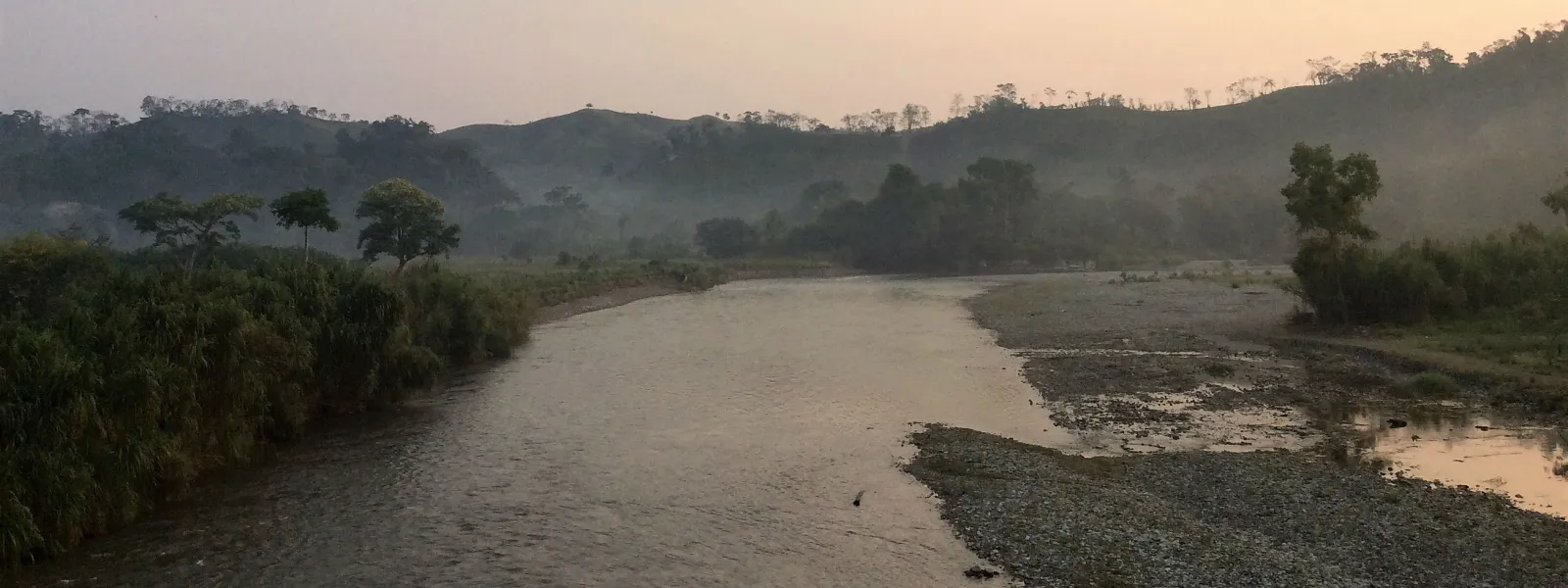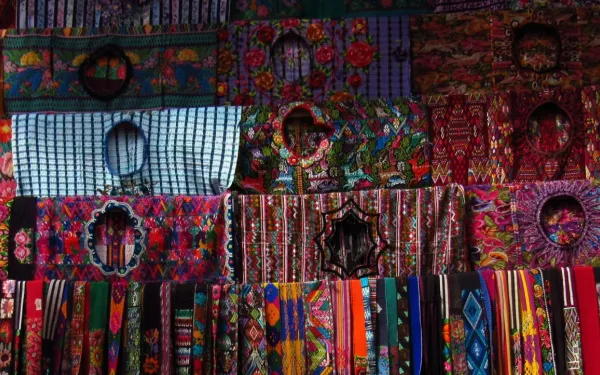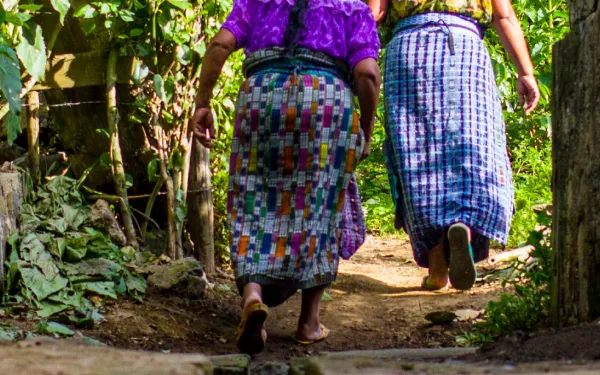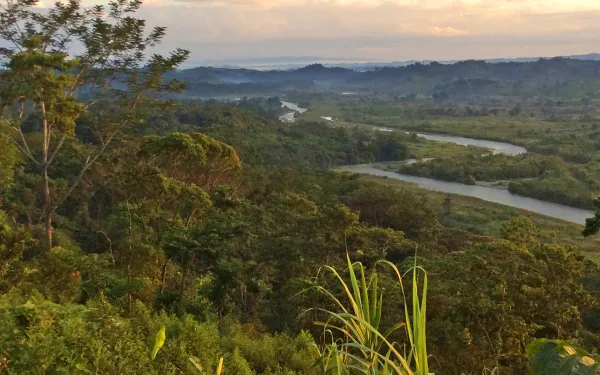
Project
Liliana Ávila /AIDAMayan women’s struggle before the Inter-American Development Bank in Guatemala
Mayan communities succeeded in getting the IDB Invest to develop a responsible exit plan after withdrawing its financing for two hydroelectric projects that negatively impacted ecosystems and the livelihoods of indigenous peoples, especially women, in the micro-region of Yichk'isis (Ixquisis).
In the struggle to defend their water, territory and way of life, indigenous Mayan communities in the Yichk'isis (Ixquisis) micro-region of northern Guatemala convinced the Inter-American Development Bank Group to withdraw its financing of two hydroelectric dams whose implementation violated their rights. The decision was also significant in that the IDB, for the first time, designed a responsible exit plan.
That historic advance was the result of the complaint that the communities filed in August 2018—with the support of AIDA, the Plurinational Ancestral Government of the Akateko, Chuj, and Q'anjob'al Native Nations, and the International Platform against Impunity. The complaint was filed with the Independent Consultation and Investigation Mechanism (MICI), the IDB Group's accountability office.
In resolving the case in September 2021, the MICI concluded that IDB Invest failed to comply with its own operational policies and safeguards, in the framework of the financing granted to the company Energía y Renovación S.A. for the implementation of the San Mateo and San Andrés hydroelectric projects.
Learn more about this achievement
In the mountains of Northwestern Guatemala, near the border with Mexico, the land is rich and fertile. Several important rivers and many other water sources feed the soil.
The residents of these mountains, many indigenous women of Mayan descent, have long depended on the waters to nourish them, to provide them with fish, as well as for agriculture, sanitation, and cooking.
But the construction of the San Mateo and San Andres dams has caused water scarcity and the contamination of rivers and other natural resources long cherished by the communities.
The near lack of water has also drastically reduced harvests, lessening the income gained from selling corn, wheat, beans, coffee, sugar cane and other products in the market. As a result, the conditions of poverty in the area have deepened.
And the risk situation is profound, particularly for women, who have played a very important role in the defense of water and territory threatened by hydroelectric projects, and are therefore victims of intimidation and stigmatization.
As guardians of their land and water, they have come to its defense and they’ll continue to prevent environmental deterioration from further harming their families.
Read our fact sheet on the case

Related projects
Latest News

Organisations demand justice in criminalization case against Rigoberto Juárez, ancestral authority and environmental and human rights defender of Guatemala
Organisations dedicated to the protection of human rights defenders, and national and international organisations working on the promotion and protection of human rights and indigenous peoples rights, express our concern over the criminalization process against Rigoberto Juárez, ancestral authority, environmental and human rights defender, and general coordinator of the Plurinational Ancestral Government of the Original Nations Mayas Akateka, Chuj, Q’anjob’al y Popti’.The judicial process against Rigoberto began in 2015 due to his role as a mediator and ancestral authority in a land conflict within the Q'anjob'al territory, specifically in the Ixquisis micro-region. This conflict arose from the indigenous Maya community's resistance to the poorly implemented and unconsulted hydroelectric projects by Energía y Renovación S.A., financed by BID Invest.The judicial process lacked an intercultural and differentiated approach. Additionally, the decisions made in the second instance and by the cassation court have ignored the factual and legal arguments presented by the defense regarding Rigoberto Juárez's role as an ancestral authority, which involved, at the community's request, assuming a mediator role in the high-conflict situation.From the perspective of the signing organizations, this judicial process has been used as a reprisal mechanism against the human rights defender’s legitimate human rights work. In particular, due to his crucial role in bringing visibility to, and reporting on, the Ixquisis case through a complaint submitted to the Independent Consultation and Investigation Mechanism (MICI) of the Inter-American Development Bank. Evidence of this can be found in the temporal overlaps of this process with crucial moments of the complaint filed with the MICI.In view of this concerning situation, we request judicial authorities to consider the arguments submitted by the legal defense of Rigoberto Juárez in the amparo action filed on 22 August and to make a decision that takes into account the specific guarantees of Rigoberto Juárez as an ancestral authority and as an environmental and human rights defender. Likewise, we call on international human rights institutions to urge the State of Guatemala to resolve the case of Rigoberto in accordance with their international obligations, and to prevent and address the serious trend of criminalization of indigenous authorities exercising their rights and responsibilities. Signed by:International Platform against ImpunityProtection International MesoaméricaInteramerican Association for Environmental Defense (AIDA)Franciscans InternationalRed Nacional por la Defensa de la Soberanía Alimentaria en Guatemala (REDSAG)Bank Information CenterInternational Service for Human RightsFront Line DefendersNISGUA (Network in Solidarity with the People of Guatemala)ASERJUSP. Marco Tulio Recinos Torres. CPPS.Center for International Environmental Law (CIEL)María Eugenia Solís GarcíaAlba Cecilia del Rosario Mérida PiedrasantaPress contact:Víctor Quintanilla (Mexico), AIDA, [email protected], +521 5570522107
Read more
Open Letter from Civil Society Organizations to the President of the Inter-American Development Bank
The undersigned group of civil society organizations greet you as you begin your term as President of the Inter-American Development Bank. We extend to you our best wishes as you assume this task of great responsibility for the people of Latin America and the Caribbean.We take this opportunity to introduce ourselves and express our willingness to continue contributing to the Bank's actions pursuing the region's development. Since 2017, our organizations have been monitoring and making recommendations on the IDB policies and projects, in partnership with local communities and populations. In particular, we promote the Bank’s establishment of better social and environmental policies and practices, as well as adequate and transparent spaces for participation that allow improving the IDB's link and interaction with civil society. To mention just a few examples, we highlight our contributions to the Environmental and Social Policy Framework (ESPF), to the updates of the MICI policy and in the accompaniment of specific cases, and in the revision process of the Access to Information Policy and in the dialogues on the IDB-Amazon Initiative.In conjunction, we are permanently monitoring the Bank's policies and investments throughout the region, including in projects involved in the response to and recovery from the Covid pandemic and many others.We consider it essential that the Bank strengthen its practices and operations, facilitating the promotion and respect for human rights, with special attention paid to the needs of communities and indigenous peoples who are at the forefront in the defense of nature, as well as the protection of key ecosystems in the fight against climate change.Given the relevance of public participation in promoting full development, we reiterate our request to the Bank to generate constructive and lasting participation mechanisms. In particular, we request that the space for dialogue with civil society be reopened in the framework of the next IDB Annual Meetings. This space was a traditional practice that was interrupted in 2014 and has not been resumed to date.We understand that a space for IDB articulation with civil society (social organizations and movements, Indigenous groups, and others who are affected) is not only a good practice that other multilateral agencies are already implementing, but would also contribute to advance the objectives of your administration. As stated in your inaugural speech last January, you stressed your desire to "seize all opportunities for dialogue" and collaborate with different actors to address the most pressing problems of our region.Thus, your administration has an historic opportunity to generate greater openness towards civil society organizations and communities potentially affected by Bank-financed operations. We believe that this demand can no longer be postponed, and that this long-standing claim must be addressed in order to strengthen the work together with the peoples of the region.We remain at your disposal to discuss the points raised in this letter and other matters of common interest at your convenience. Kind regards, Accountability CounselAMATE El SalvadorArticulación Salvadoreña de Sociedad Salvadoreña de Sociedad Civil para la Incidencia en las Instituciones Financieras Internacionales (ASIFI)Asociación Ambiente y Sociedad (Environment and Society Association)Interamerican Association for the Defense of the Environment (AIDA)International Accountability ProjectBank Information CenterCenter for International Environmental Law (CIEL)Coalition for Human Rights In DevelopmentCohesión Comunitaria e Innovación Social A.C. (Mexico)Conectas Direitos HumanosDerecho, Ambiente y Recursos Naturales (DAR, Perú)Ecoa - Ecology and ActionFoundation for the Development of Sustainable Policies (Fundeps)CAUCE Foundation: Environmental Culture - Causa Ecologista (Argentina)Gender ActionInternational RiversMesa de Discapacidad y Derechos (Perú)International Platform against ImpunityProtection International MesoamericaSociedad y Discapacidad - SODIS (Perú)Sustentarse (Chile)Wetlands International / Fundacion Humedales (Argentina) Read and download the letter
Read more
Indigenous victory as development bank withdraws investment and drafts exit plan following rights violation in Guatemala
In a historic advance, the Inter-American Development Bank has designed a responsible exit plan to accompany their divestment from two controversial large dams in the Yichk'isis micro-region of Guatemala. Affected Mayan communities celebrate the decision, a response to their 2018 complaint, while acknowledging that the Bank has several challenges left to confront. Washington, DC, U.S.A. The Inter-American Development Bank (IDB) announced its decision to withdraw financing from the San Mateo and San Andrés hydroelectric projects, run by the company Energía y Renovación S.A. in the micro-region of Yichk'isis (Ixquisis) in northern Guatemala. The Bank designed a responsible exit and institutional strengthening plan to address the weaknesses the case revealed. The Bank’s decision stems from a complaint affected Mayan communities filed in 2018 before the IDB Group's Independent Consultation and Investigation Mechanism (MICI, for it’s Spanish initials). In resolving the complaint, the accountability office concluded that IDB Invest failed to comply with the bank’s operational policies and safeguards in the framework of project financing, and opened the possibility of a withdrawal of investment. "It’s an opportunity for the bank to take into account the lessons learned from the case: among them the relevance of understanding the local contexts of projects, the socio-cultural dynamics of the populations that will be directly affected, and the local perspective of development to determine the viability of the financing," says Liliana Avila, senior attorney of the Human Rights and Environment Program of the Interamerican Association for Environmental Defense (AIDA). "It is also an opportunity for the bank to strengthen the monitoring and supervision of the projects it supports in order to prevent non-compliance.” The divestment was finalized in October 2021, when IDB Invest and Energía y Renovación S.A. signed settlement agreements. Notably, this is the first time that the IDB Group, as a result of a complaint, has drawn up a plan to make its exit responsible. However, there are still challenges and pending issues that the financial institution must address in the process of exiting hydroelectric projects. "In order to prepare the responsible exit plan, IDB Invest must carry out consultation processes with the affected communities, which will largely define the plan's capacity to effectively address and offer viable solutions to the damages recognized in the MICI report, such as the increase in conflict, the lack of knowledge of the existence of indigenous peoples and their rights, the effects on ancestral cultural heritage, the differentiated impacts on women and the lack of prevention and consequent environmental degradation," said Carolina Juaneda, of the Bank Information Center. "If these issues are not addressed and included in the responsible exit plan, all this effort will not have been worthwhile since, ultimately, it will not lead to any improvement or reconstitution of living conditions for the affected people and the environment." The action plan proposed by the entity establishes that IDB Invest will create a transition plan translated into the native languages of the affected communities, as well as a gender-differentiated impact assessment, and an investment to promote financial inclusion and women's empowerment in the area. In addition, the plan contains actions to address MICI's recommendations for structural changes at the institutional level. In this regard, the bank plans to strengthen the environmental and social safeguards unit of IDB Invest in the area of indigenous peoples, as well as to establish a zero tolerance policy for gender-based violence, which will be included in the contractual conditions of operations approved by the bank. Existing protocols will include tools to follow up on acts of violence associated with projects financed by IDB Invest. Regarding the categorization of projects, an update will be made so that the internal supervision classification will be modified to a higher one when circumstances are identified that raise the risks and impacts of a project after its financing was approved. "The bank's responsibility in the investment process and in the non-compliance with its social and environmental safeguards is evident; therefore, it must promote during the exit process the effectiveness of the actions in a participatory manner, free of manipulation and in an inclusive manner with the community to reduce the risks of re-victimization and violation of the affected population," indicates Mara Bocaletti, Director of the International Platform against Impunity. "This experience is a first step to maximize the benefits in the territories so as to make amends for the damage caused." The communities submitted their complaint to MICI in August 2018 with the accompaniment of AIDA, the International Platform against Impunity and the Plurinational Ancestral Government of the Akateko, Chuj, Q'anjob'al and Popti' Native Nations. In it, they requested that IDB Invest withdraw its investment due to the damage that the implementation of the projects has caused to the environment, indigenous peoples and women of Ixquisis. In September 2021, the IDB Group Board of Directors approved the MICI report, which concluded that IDB Invest failed to comply with its own operational policies and safeguards for at least five reasons: 1) validating an inadequate characterization of the affected population, which denied the existence of indigenous peoples; 2) failing to verify the completion of an identification of gender-differentiated impacts on women; 3) failing to ensure that the client made an adequate identification and management of environmental impacts; 4) failing to ensure that the communities were properly informed and consulted; and 5) failing to carry out adequate monitoring of local conflict risks that could be generated in the area because of the projects. "The MICI report confirms that IDB Invest failed to comply with its policies, generating adverse impacts on the lives of the communities. The company Energía y Renovación did not act with due diligence in the framework of its operations and, on the contrary, has implemented strategies contrary to the respect of human rights. Currently, several indigenous authorities and human rights defenders are criminalized, making undeniable the continued risk for the communities," says Rigoberto Juárez, General Coordinator of the Plurinational Ancestral Government. "Given this evidence, it’s important that IDB Invest guarantee actions aimed at repairing the damages caused to the communities in the framework of the financing of these projects, and more strongly recognize its responsibility." press contacts: Victor Quintanilla (México), AIDA, [email protected], +521 5570522107 Camila Castellanos, Plataforma Internacional contra la Impunidad, [email protected]
Read more